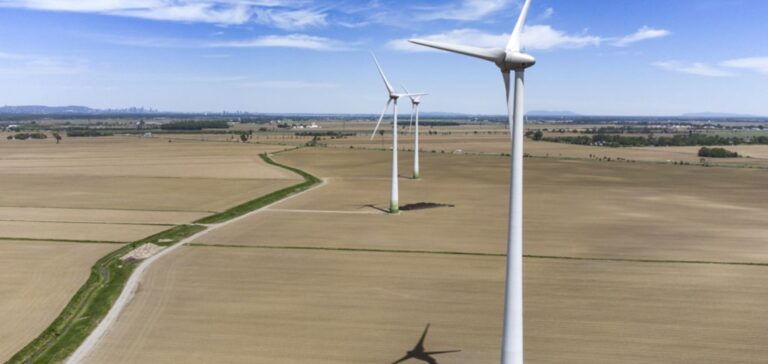Faced with the climate crisis, the G20 meeting in New Dehli over the weekend endorsed for the first time a tripling of global renewable energy capacity by 2030: an ambitious and indispensable goal, but one that will require more than a declaration of intent, experts point out.
G20 Supports Tripling Renewable Energy: A Vital Goal for Carbon Neutrality
Q: Why triple solar, wind and other renewables?
A: The G20 “will continue and encourage efforts” to this end, according to the final declaration, which endorses the experts’ recommendations, already echoed a few weeks ago by the Emirati Sultan Al Jaber, President of COP28, which will meet at the end of the year in Dubai.
The G20 countries, which include Russia and Saudi Arabia and emit 80% of all greenhouse gases, have made no move to reduce the use of fossil fuels.
For Dave Jones, an expert with the Ember think-tank, the mention is a welcome surprise, bringing us back to the heart of the matter:
“Until recently, we were very focused on hydrogen or carbon capture, losing sight of what was most important”.
After all, tripling renewable energies is the unavoidable objective of carbon neutrality scenarios, notably that of the International Energy Agency (IEA). If the world is to stay below 1.5°C of warming, this will be “the most important lever” for reducing demand for fossil fuels (coal, gas, oil), the agency stresses.
A threefold increase means avoiding 7 billion tonnes of CO2 between 2023 and 2030,” she points out. According to the IEA, this would make it possible to cover the growth in electricity demand linked to transport, heating and the expected boom in air-conditioning.
According to the IEA, this could halve the volume of electricity generated by coal, the number one source of CO2 today.
Towards Major Renewable Energy Growth: Challenges to Overcome to Triple Capacity by 2030
Q: What does this mean?
In concrete terms, this would mean an increase from 3,600 gigawatts (GW) from renewables at the end of 2022 to 11,000 GW in 2030, explains Dave Jones. With the world having installed 300 GW of new capacity by 2022, and hoping for a further 500 GW by 2023, we need to rapidly reach 1,500 GW per year by 2030.
Progress is already being made. From 2015 to 2022, renewable installations grew by an average of 11% each year. And against a backdrop of soaring oil and gas prices and energy insecurity linked in particular to the war in Ukraine, the IEA expects unprecedented growth in new renewable capacity in 2023 (+30% approx.).
Growth in photovoltaics is strong. China could reach its 2030 target of 1,200 GW as early as 2025. Globally, component manufacturing capacity now exceeds demand, and should reach 1,000 GW per year by 2024 in China, but also via projects in the USA, Europe and India.
Wind power, on the other hand, is experiencing difficulties. Faced with rising costs and interest rates, the industry is struggling to keep up with demand, and is calling on governments to review their allocation methods.
“Many challenges remain”, sums up the IEA, for whom “tripling renewable capacity by 2030 is an ambitious yet achievable goal”.
Overcoming Financial and Structural Obstacles: The G20’s Renewable Energy Transition Challenges
Q: How do we get there? Last year, 1 TW of wind and solar power capacity was shelved around the world, due to a lack of adequate power grids and permits, according to the Ren21 research network.
Solar power, wind power, dams, geothermal energy, biomass… these well-known technologies, which are often quick to deploy, also require investment to get off the ground, particularly in emerging and developing countries.
“We need 4,000 billion dollars a year and we’re nowhere near that!” laments Rana Adib, Director of Ren21. The mention of the G20 “is a positive thing, but there is no concrete commitment”. “We know that the energy transition also means halting new investment in fossil fuels. Yet in 2022, fossil fuels received $1,000 million in subsidies, 85% more than in 2021”, she notes.
The consequence is clear, she insists: oil, gas and coal still account for over 80% of the world’s final energy consumption, a rate that has not changed for years.
Why does it matter?
Tripling renewable energies is crucial to achieving carbon neutrality and reducing CO2 emissions. However, financial and logistical obstacles must be overcome to achieve this essential energy transition.





















